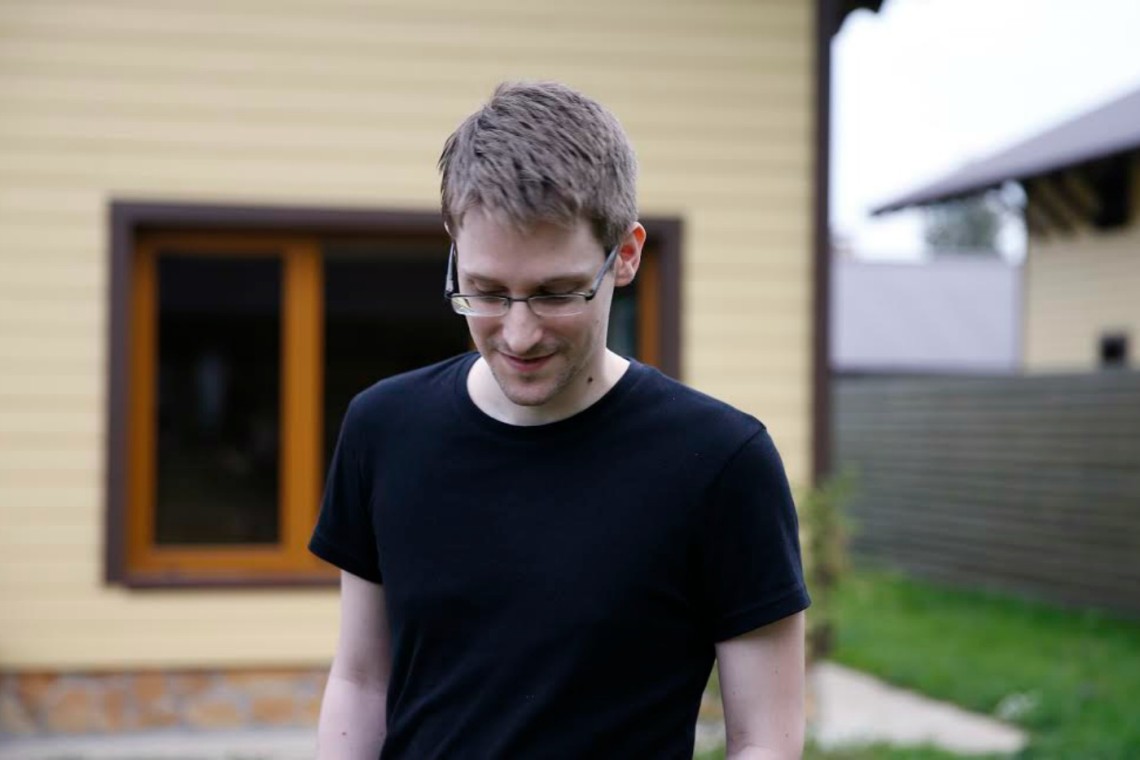One of 2014’s more compelling documentaries, Laura Poitras’ Citizenfour channels the measured cool of its subject—former National Security Agency analyst-turned-whistleblower Edward Snowden—and eschews the sensationalism of so many docs for a chilling, information-focused procedural that moves with the precision of a narrative thriller. A formally unusual work, this fluid tableau of data exchanges and secret meetings invites its audience to collaborate in what feels like real time, while simultaneously seeming to watch them through the screen in return: You may be under surveillance, right now.
The third film in Poitras’ post-9/11 trilogy, following My Country, My Country (2006) and The Oath (2010), the very existence of Citizenfour wasn’t known until shortly before its recent premiere at the New York Film Festival. And the film literally emerges from darkness, opening on a shot of tiny squares of light as they strobe from the lower part of the screen through a black tunnel, suggesting the mysterious passage of information that Poitras captures. While Snowden is initially presented via his coded online exchanges, the film soon meets him in person—in self-imposed exile in a Hong Kong hotel room. It’s here that the tense game of wits with the media and US government really takes flight.
The degree to which Poitras may have set up her film’s scenarios—Snowden pacing his hotel room or conversing with Glenn Greenwald, his Guardian journalist advocate—is never far from mind, though cinematic sleight of hand does nothing to alter the effect of what’s unfolding. Citizenfour is right there as Snowden considers his options ahead of his bombshell revelation about the NSA’s wide-ranging surveillance, and it offers a fascinating look at a new face of dissent: quiet, hyper-intelligent, and willing to stake his personal life to expose a scenario affecting the global population. Snowden’s heroics are nearly interior, but their impact carries more weight than the choices made by the most blustering action hero. (Is an offer already out to Ryan Gosling for Hollywood’s inevitable fictionalization?)
Once Snowden goes public with the NSA information, Citizenfour glides seamlessly into a kind of globetrotting hopscotch puzzle not unlike executive producer Steven Soderbergh’s Contagion. (Poitras, not incidentally, shares her EP’s penchant for cool, asymmetrical exteriors involving indifferent architecture.) Amid the media maelstrom and the NSA’s manhunt, Snowden is forced underground and to Russia, while Greenwald is hounded and Poitras—herself on government watchlists after her previous documentaries—hides out in a Berlin community of activists. That no one was apprehended is surprising; that this film was somehow assembled and distributed approaches the miraculous.
What resonates most is the thrill of immediacy the film cultivates. By cleverly combining fly-on-the-wall footage with interviews, WarGames-style text-messaging banter, and the perpetually chattering screens of the 24-hour news cycle, Citizenfour uses its enemies’ tactics to distill the noise of mass media to its essence: information. Despite covering events initiated a year prior, the film’s ability to create a sense of clear-minded urgency is one of its strongest assets. The thrilling payoff of this tactic arrives in a late-film reveal that dovetails with the present—it’s as satisfying as any narrative climax, too, especially given the open-ended air of possibility.
If there are issues with Citizenfour, they may be regarding how the film is delivered—and to whom. While the film is assured and effectively disturbing, it’s also reasonable to wonder whether it’ll largely play to an audience already convinced they’re living in an Orwellian nightmare. Effective cinema, to be sure—but is cinema effective? It might be that rare case where distributors consider advocating online piracy as a promotional tool. (Not that we’d ever suggest such a thing.)





















3 thoughts on ““Citizenfour””
Pingback: Review: Citizenfour | Luke Goodsell
Pingback: Review: Laura Poitras’ “Citizenfour” | Luke Goodsell
Pingback: Laura Poitras's Post-9/11 Trilogy is Complete, and You Can Watch the First Two on Fandor | Movie Mezzanine